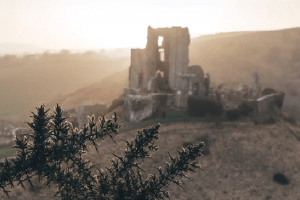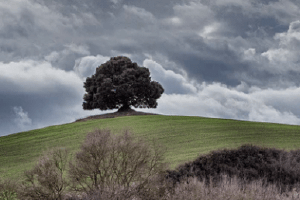Three years ago, our neighborhood was evacuated while we were out of town for a family wedding. I kept joking to anyone who would listen that I had my family and my laptop and that was enough, but I wasn’t okay. Especially after a friend called and told me two houses on our street burned down but she didn’t know which.
Yeah. Nothing about having your family home in a Schrodinger’s Cat situation is okay.
The year before, we lost four parents/step-parents in the space of twelve months. Loss was getting to be a habit for our family, and I genuinely couldn’t envision a possible future where we didn’t lose our home too. *
*Spoiler: We didn’t lose it.
When we finally came home over a month later, there were out-of-control fires less than an hour away in three different directions. We were packed and ready to go 24/7. I wore a bra to bed every night because when your world is burning you try to control what you can, and for me that bizarrely included undergarments.
The fact I was supposed to be working on revisions for my agent added even more pressure. Writing quickly became this blurry splotch in the rearview mirror of my life as circumstances conspired to hurl me into one of the most intense mental health crises of my life.
Which begs the question . . . is it even possible to keep writing when your world is literally—or metaphorically—on fire? Can you keep hold of your creativity in the face of intense trauma, when all your brain wants to do is sleep or binge watch your favorite shows on Netflix?
I have no way of knowing what your answers to those questions might be. For me, the answers changed every day, but what didn’t change was a yearning to figure out how to unlock the barricade between fear and creativity.
One day, I sent the following message to my critique partners:
“Wrote some words today and actually loved them.”
I don’t know if these steps will help anyone the way they helped me, but in case they might, here’s how I did it.
Step 1: Forgive yourself if you stop.

Stopping is normal. Shutting down is normal. Not being able to find words is normal. When you’re experiencing trauma, your brain looks for ways to protect itself—to protect you. This is a natural process, and shame is not the override key it claims to be.
Treat yourself with the same level of tenderness you would give to a dear friend in similar circumstances. Offer yourself shelter from the lie that you have failed at writing because grief stole your words.
Robbery victims aren’t failures and neither are you.
Step 2: Fight panic with an awareness of the temporary.
Trauma lies to us. It tells us that the current struggle is our new normal and past joys are forever out of reach now.
And oh gosh. How true that feels in the moment! The impact of trauma is anything but temporary, but the intensity and vulnerability of a freshly dealt blow is. Eventually, the pain will diminish, and there’s comfort to be found in that.
Step 3: Experiment.
It can help to try something outside your normal. Go somewhere you’ve never gone before. Do something you’ve never done. Orate your stories and record them. Write using different materials, or in a different age category or genre.
Sometimes the best way through a difficult experience is to give yourself permission to step outside it every once in awhile. To remind yourself that there are new and potentially wonderful moments waiting on the other side.
Step 4: Avoid harmful writing advice.
Not all writing advice is bad, but the harmful kind abounds. I’ve seen famous authors say things like:
• “If you don’t write every day, you’ll never make it.”
• “If you don’t carry pen and paper with you everywhere, you’re not a real writer.”
• “You know you’re supposed to write if you wake up every morning needing to.”
Statements like these are powerful, quotable, and inherently dangerous. No. You do not have to write every day, or even every week to “make it.” Plenty of successful authors have stopped just like you have, shut down just like you have, felt the weight of grief and pressure and chaos just like you have.
Do what works for you, and don’t put too much stock in the opinions of people who think what applies to them applies to everyone. That includes me. Your brain doesn’t work the way my brain works, and that’s okay. That’s normal. That’s good.
Step 5: Remind yourself that you don’t have to suffer to create.
Our stories are tapestries into which we weave elements of our life experiences: the light and the dark, the joyful and the sorrowful, the painful and the transcendent. When the worst of your trauma has passed, and your brain comes out of lockdown mode and the words start flowing again, you might notice that they have a deeper quality than they did before.
But. But.
You don’t have to live in that place—that dark well you drew those powerful words from. You can find deep words in bright places too. Through empathy, through newness, through love. Through unique viewpoints that take you and your stories to places you couldn’t reach otherwise. Suffering isn’t the only key capable of unlocking creativity.

Every one of these five steps has a singular connecting thread: Give yourself permission to be a human being having a hard time. Listen to messages and adopt creative strategies that honor that core truth. And shun the lies and the liars who claim you are less than for being vulnerable to stress and grief.
You are beautifully and gloriously human. And you’re going to tell us some incredible stories. When you’re ready.

















